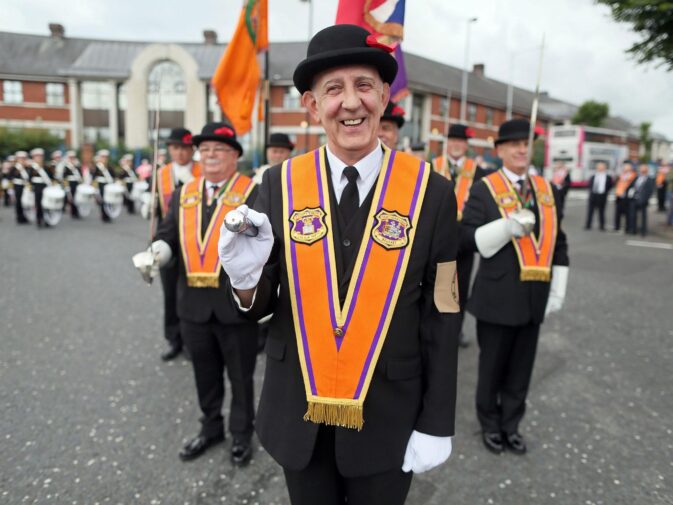

The Brexit campaign has been directly responsible for a huge spike in national chauvinism and racist violence. To deny or minimise this, as some on the left do, is to completely ignore the impact of reactionary arguments like “needing to take control of our borders”, “stopping free movement from the EU” and “restoring national sovereignty” that have dominated the Brexit agenda. There is no progressive dynamic here but a reactionary harking back to Britain’s imperial past and accepting the myth that migrants are to blame for economic woes.
Little wonder then that in the north of Ireland the dominant voice of Unionism, the Democratic Unionist Party (DUP), in collusion with their Loyalist paramilitary friends, have gleefully jumped on the Brexit bandwagon. For them, UK not EU membership is paramount, even if it means a hard border and economic ruin. Any sign of a border running down the Irish Sea as in the Johnson deal is sliding down the slippery road to a united Ireland.
Yet there was still a majority Remain vote of 56 per cent in “Northern Ireland”. Indeed, a layer of Unionist supporters, mindful of their farming, business and job prospects, were terrified of the economic ruination that a hard border and Brexit would bring.
But despite all the DUP hot air about not wanting a hard border with the South, they are prepared to play the Orange Card in their pursuit of Brexit. Quite simply this means raising the spectre of a united Ireland to whip Unionists and loyal Ulster into line, into their traditional sectarian support for the British state, and in defence of their border and their Britishness.
DUP/Loyalist collusion
A DUP meeting with the loyalist paramilitaries last month cemented their mutual rejection of the Johnson deal. This was closely followed by a Loyalist paramilitary gathering of a few hundred where the loyalist activist Jamie Bryson threatened mass resistance and civil disobedience if a bad deal or an “economic united Ireland” goes ahead. Fellow loyalist Robert Girwan issued a veiled threat: “I was talking to someone who said we’ll see how hard the border is when bombs start going off in Limerick”.
Remember, these Loyalist groups, like the UVF and UDA that murdered over 1,000 people, mainly Catholics, and, as the recent BBC Spotlight series The Troubles has revealed, were aided and abetted by state forces. These groups may now be preoccupied by drug rackets and internal feuding, but a call to rally to the defence of Ulster may well redirect their efforts towards traditional sectarian bloodletting. Their talks with the DUP clearly show they still have political clout, and the DUP’s links with the murder squads.
GFA DEMISE
DUP ambivalence to the Good Friday Agreement (GFA) is more than matched by Loyalist rejection of it. The DUP had to be dragged screaming to sign the deal. Hard-line Unionism was not about sharing power with Catholics/nationalists. The whole premise of the Unionist state of “Northern Ireland” since its birth in 1921 was majority rule. A regime that combined a virulent anti-Catholic and anti-Irish discrimination alongside large doses of repression to consign over a third of the population to the status of second-class citizens.
The GFA as a power-sharing experiment only got the DUP on board when it became clear that the Union was not threatened by Sinn Fein/IRA, i.e. when the latter agreed to a Unionist veto on partition and decommissioned its weapons. Subsequent support for the police was a sure signal that the Republicans had dropped the fight to get Britain out of Ireland.
Apart from copper-fastening the Unionist veto on a united Ireland, the GFA provided for an executive and Assembly that implemented a sectarian distribution of spoils to the political and middle class representatives of both communities. The executive at Stormont served its use for Westminster by implementing austerity and giving the appearance that Catholics had a real say.
But Stormont collapsed nearly three years ago. DUP corruption over a green energy scheme triggered the collapse. Their intransigent rejection of single sex marriage and Irish language rights, which Sinn Fein backed, has continued the deadlock. The DUP seemed content with direct rule, but recent pressure from the Presbyterian Church over the application of UK-wide laws permitting abortion and single sex marriage in the north saw them hypocritically stage an unsuccessful stunt to reconvene Stormont with the aim of reversing this legislation.
No border
Despite the GFA’s demise, peace does continue and all sorts of politicians from the EU and the Irish government through to the Labour Party maintain that a hard border will damage the GFA and peace. This eulogising of the GFA completely misses the point.
The GFA is dead in the water. Brexit certainly doesn’t help it, but it died because Unionism still regards 45 per cent of the population as the enemy within and as an emissary of a foreign country. Holding their noses and sharing power only works for a while.
Brexit has compounded this built-in contradiction of the northern state, since it risks altering the economic relationship between the UK and the Republic of Ireland. Brexit of any kind, hard or soft, will involve some hardening up of the border through checks and safeguarding of standards and goods. This will severely disrupt both the northern and the southern economy.
The absurdity of creating the border in the first place needs to be redressed whatever relationship ensues between the UK and the EU. Stopping Brexit will facilitate an open border, but getting rid of the border altogether involves bringing the Irish people as a whole into the equation – to freely determine their own future with no interference from Britain.
Until that is done Ireland’s national question will remain unresolved and we face many more years of reactionary Unionist vetoes on everything from Irish language, abortion, single sex marriage and membership of the EU to the border itself.